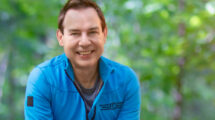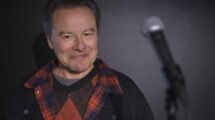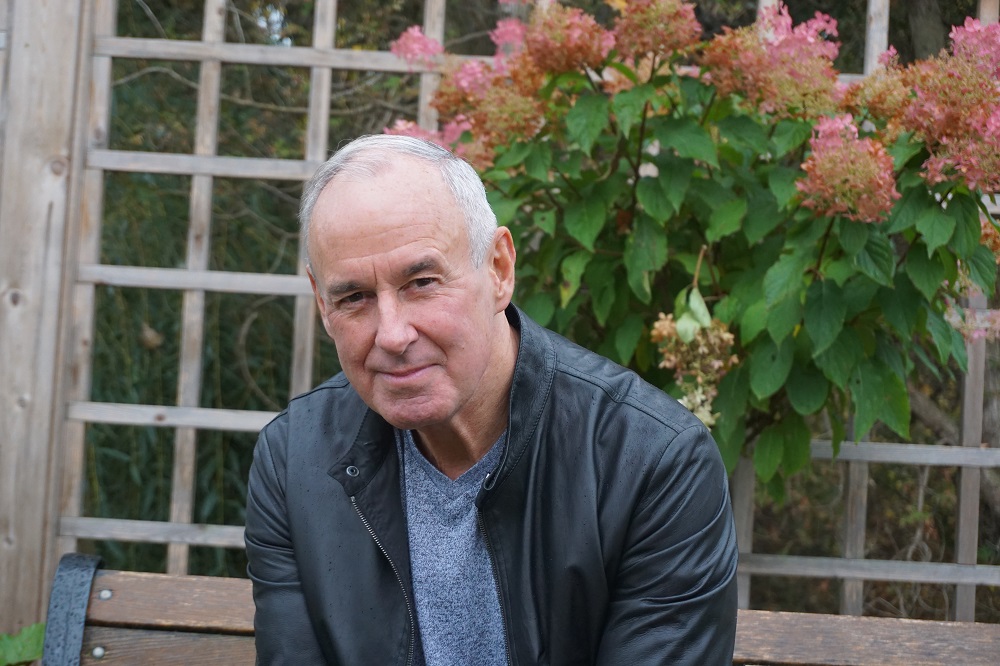 Ron MacLean’s Wisdom and Knowledge
Ron MacLean’s Wisdom and Knowledge
It’s not all about the hockey
It was Prime Minister Lester B. Pearson who said: “This fastest of all games [hockey] has become almost as much of a national symbol as the maple leaf.” There is no question hockey is engrained in our cultural identity and those who have been associated with our beloved sport, bringing it to TVs, electronic devices and radios, are also cherished in our hearts. Regardless of whether you are a hockey fan, there is no question when you see his face, his smile, or hear his iconic friendly voice, Dr. Ron MacLean (he actually grimaces when hearing that) will warm your heart.
In 2018, Lakehead University honoured him with a Doctor of Humane Letters and then in 2019, the University of Alberta acknowledged his incredible contributions to Canadian sport and culture with an honorary Doctor of Laws degree. There is no question Ron has more than earned those two letters in front of his name. Host of CBC’s Hockey Night in Canada, Coach’s Corner, a commentator at six Olympic Games, a 10-time Gemini Award winner, two-time recipient of the George Gross Award for excellence in sports broadcasting and author of two books are just a few of his accomplishments. He was inducted into the Alberta Sports Hall of Fame in 1996,the Canadian Association of Broadcasters Hall of Fame in 2000,and Canada’s Walk of Fame in 2015,to boot. Today, in addition to Hockey Night in Canada, you can see him on the show Battle of the Blades and Rogers Hometown Hockey. Ron is almost 61, and like all of us, there is a wisdom and knowledge that comes with a few times around the sun, and it shines through when talking with him.
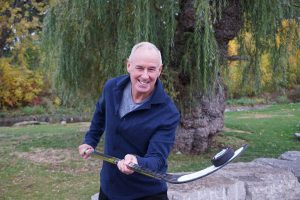 Yes, he exudes hockey (he still plays himself) and it is interesting to hear his take on the sport, of course, but it is most fascinating to hear his philosophy on life, what makes him tick, and how he views the world around him.
Yes, he exudes hockey (he still plays himself) and it is interesting to hear his take on the sport, of course, but it is most fascinating to hear his philosophy on life, what makes him tick, and how he views the world around him.
Ron has a keen, curious intellect and is a voracious reader. His bookcase — more like book wall — is longer than many people’s houses. Topics such as ethics, politics, social issues all grace the shelves. “I have John Raulston Saul, the story of George Erasmus, Black Lives Matter, women’s issues, sports labour, rock and rollers and poets, Patti Smith, Kurt Vonnegut, Canadian author Miriam Toews [he is particularly fascinated by her books that delve into mental health, Harper’s Magazine a whole shelf’s worth — all of it interests me.”(Of course, there is a hockey/sports section, too, with biographies and strategy books from Olympic athletes to hockey players and coaches.)
He also has an insatiable appetite for philosophy. “In high school, I read Viktor Frankl’s Man’s Search for Meaning, (the author’s memoirs and quest to understand and find meaning in his experiences in Nazi death camps),and Eric Fromm’s The Art of Loving. Those two books whet my appetite for what the great philosophers and wisdom writers could offer us.”
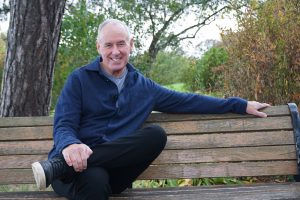 One of his all-time favourite books is Where Shall Wisdom Be Found, by Harold Bloom. His face lights up when talking about it and his love of the written word is infectious. He shares it with everyone he meets giving books away, generously so in fact (including me and my son).
One of his all-time favourite books is Where Shall Wisdom Be Found, by Harold Bloom. His face lights up when talking about it and his love of the written word is infectious. He shares it with everyone he meets giving books away, generously so in fact (including me and my son).
While he didn’t get into reading until his teenage years, he has definitely made up for lost time. “I have read thousands of books by now,” sometimes multiple books in a weekend.
However, growing up, it was the TV that entertained him. “Mom and Dad loved political science and we watched political conventions. I have vivid memories of being seven or eight in Whitehorse, when Pierre Elliott Trudeau won the Liberal nomination. The grandeur of that event. Then Brian Mulroney in 1983. Those kinds of events created a sense of wonder.” (He himself would make an amazing contribution to
politics with his empathy and good sense, but that he says, is not in the cards.)
A military kid and an only child at that, one thing he had to become used to, was the nomadic existence of his family. It influenced his outlook on life. Christmas celebrations and holidays were with his small, nuclear family of three — his mom, dad and himself. They were a close family, and according to Ron, he had a wonderful childhood. But the constant moving around affected his way of thinking.
“For sure it was a constant uprooting. There was the loss of friends I made, but it was the summers that were the worst because until you got back to school to make acquaintances there, you were lonely.
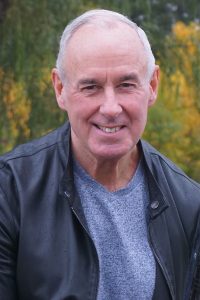 However, I also remember vividly driving back and forth across the country several times. I got to see what Thunder Bay was like, the difference between the Prairies and the top of Lake Superior. So, I was appreciating the experiences, but for sure, your world is rocked every two years. It was hard for my sports future.”
However, I also remember vividly driving back and forth across the country several times. I got to see what Thunder Bay was like, the difference between the Prairies and the top of Lake Superior. So, I was appreciating the experiences, but for sure, your world is rocked every two years. It was hard for my sports future.”
Born in West Germany, he lived in France, Halifax, Victoria, Whitehorse and then back to Nova Scotia. It obviously made settling-in difficult. One thing that remained constant, was his love of hockey. It began in Whitehorse, when he was four, on bob skates playing on a neighbour’s homemade backyard rink, and he has never looked back. However, for a kid who loved hockey, cracking into hockey teams was difficult because he was never in one place long enough to fit in.
“In minor hockey, there is a clique. From Pee Wee all the way up to Triple A, these kids have been together. I understand you have a team and circle you need to trust, and it has grown together. That is the beauty of team sports, but it was a difficulty for me because I wasn’t part of those cliques because I kept moving around. I remember walking into tryouts and very much feeling like the outsider. I was on the outside looking in a lot.”
However, feeling like that has served him well. “It allowed me to understand the circumstances, and the politics of exclusion. It taught me how to be empathetic.”
It also informed what became his personal philosophical outlook. “For me, there is a great fascination of individualism versus collectivism. You see it all the time. That mix of serving and self-serving was taught to me as a child in the military. It gave a sense of wanting to build bridges. How do you create the opportunity for each person to become the best of themselves and reach their potential versus the best group results? We want to be self-made individuals, but we are no good without the community.”
While that philosophy applies to his life view, inevitably, for him the discussion veers towards the hockey world as well.“ Team sports is a microcosm of this debate of‘ to be the best I can be but find a way to fit in the team dynamic.” And he can talk about it at great length. His conversations are peppered with some of the hockey greats like six-time Stanley Cup winner Brian Trottier, Sami Jo Small (a three-time Olympian, and five time world champion goalie for the Canadian national women’s ice hockey team and founder of the Canadian Women’s Hockey League) mixed in with philosophers like Alfred Adler.
“It is about how can people be the best of themselves in their potential versus the best group result. Brian Trottier has the best line on this. Not everybody can be the best player, but everybody has the opportunity to be the best teammate and that’s a very simple, lovely way of looking at what all these philosophy books are about.”
His insight into that hockey world is unparalleled and so is his passion for it, understandably. He refereed with Hockey Canada for 23 years, played the game since he was four and has made a living reflecting on, broadcasting and creating fans everywhere out of even the hardest nuts to crack.
When you see Ron on TV, or in an interview, you would be forgiven to think that he is an easygoing kind of person. He is warm, thoughtful, insightful and empathetic, as he strives to be, but behind that veneer is a man who has fought some pretty big mental health demons over the years. “I used to suffer from severe anxiety, from the time I was 17 until about 37.” He says the panic attacks were debilitating.
“I had severe panic attacks on the day I auditioned to work in the NHL as a broadcaster and the day I actually made it as a broadcaster with Hockey Night in Canada. I mean it’s hard to even convey how horrible that feeling is when your heart is racing out of control, you know the lights are going on, and you’re going to speak. When you go on Hockey Night in Canada and there’s two million viewers and you realize you’re starting to have a panic attack and you’ve got to get this under control or that’s that career… what are you going to do next?”
Feeling alone, in part, sparked his involvement in mental health awareness to encourage people to talk about their issues. “Not only was I hiding my anxiety back then, but I didn’t know how to talk about it. We never sought help, we dealt with it alone.”
His humility and openness about his struggles, are now literally changing the lives of people. From hockey players who now feel it is alright to talk about their pain, to young kids suffering from mental illness today who look up to him and see him talking about it, he is inspiring people to come forward with their challenges, including addiction. His book Hockey Towns tells some of those stories, giving them a voice in an empathetic way. MacLean just connects with people.(He says he learned how from his mom.)
“You know the same passion that ignites you to work hard also rewards obsession. I think our careers reward obsession and unfortunately when you’re a of lots, some of the same tendencies that can go with the passion can appear when you are in front of a bottle of wine.”
“You can control many things — you can learn a lot. But if that passion spirals in other directions, it can control you, if you’re not careful. Giving people the platform to be open about them is a major step in healing and normalizing the discussion in that world.”
He is also a keen observer of people, an interest fed by his reading. “Ultimately you know from Shakespeare going forward, it’s the narrative of the human condition.” His admiration for people overcoming adversity is palpable, real and genuine and like many people who are successful at what they do, he never stops learning from others.
While books are something he can’t live without, so is music. He has a portable speaker called Anne (with an E) — for Anne Murray. “She goes everywhere I go. ”Not surprisingly, he is also a fitness fanatic. While he plays hockey because he loves it, it also keeps his heart healthy. However, he always makes sure he has weights nearby. “Especially as we age, strength training is critical.”
His humility and adherence to authenticity and genuineness is part of who he is. There is a great quote in the movie Steel Magnolias. “An ounce of pretension is worth a pound of manure,” and clearly while MacLean is far more articulate than that, he would agree.
“If I had one wish, mine would be to eradicate envy and that’s to offload this idea of status anxiety and comparisons in our world. I just have a genuine hope for others that they know that there will be a kindness and empathy. I think that would be it — if I was to describe what I’m about — I’m sure that’s in no small measure due to an Air Force and an only child upbringing and the need to rely on others because you’re forced to invite the kindness of another.”
There is an expression used in figure skating that applies to Ron: elegance without pretense. He personifies that, but of course he is so much more. He is a Canadian icon dear to our hearts.




